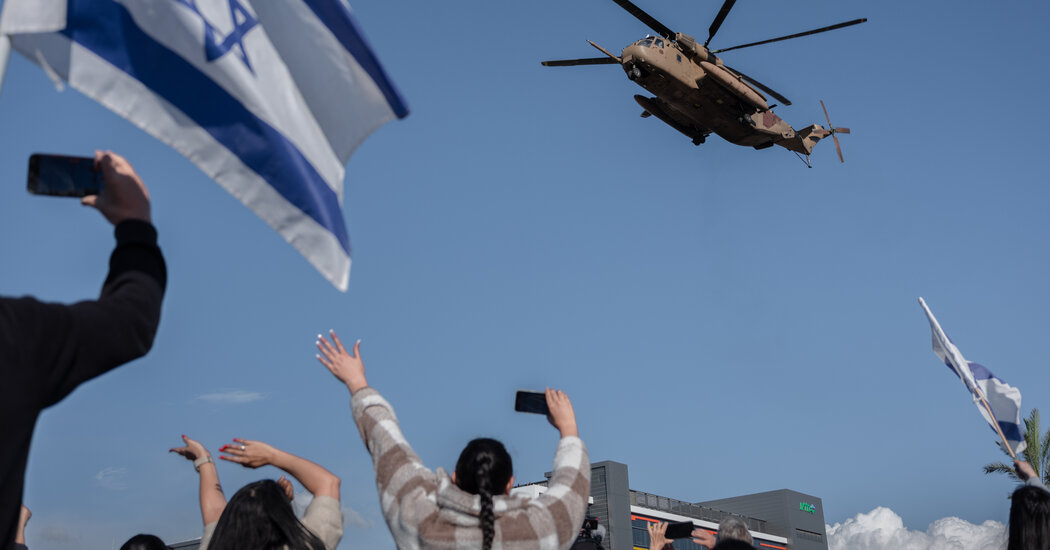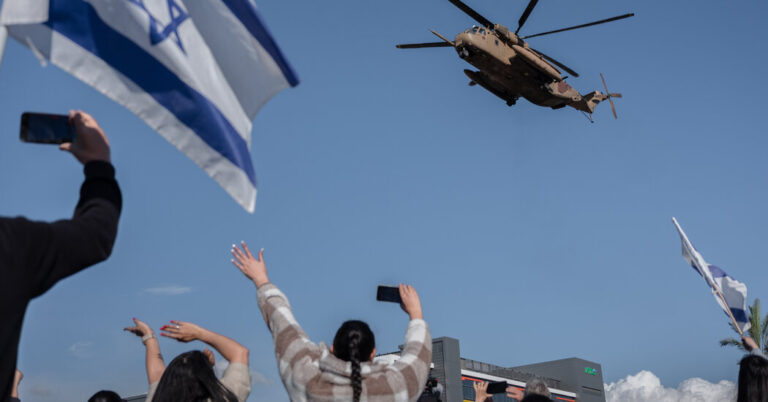On Saturday Hamas released four Israeli soldiers held hostage in the Gaza strip, in a choreographic ceremony that was the last sign of the group’s effort to project power despite the 470 -day Israeli military campaign to hunt them.
It was the second release of hostages in the context of a ceased agreement the fire entered into force almost a week earlier. According to the agreement, Saturday Israel released 200 Palestinian prisoners who had been detained in Israeli prisons.
A row of white buses transporting prisoners left the prison of Ofer, in the West Bank occupied by Israel. The prisoners were also issued by another structure near Beersheba, in the south of Israel, said the Israeli prison service.
Many of the 200 prisoners released on Saturday were serving life imprisonment for involvement in attacks against the Israelis. According to a list provided by the Palestinian authorities, about 70 people are exiled abroad as part of the agreement and will not be able to return to their homes in the West Bank and Jerusalem.
But the exchange of prisoners-on Saturdays on Saturday did not go completely according to the plans. The recipient Daniel Hagari, Israeli military spokesman, accused Hamas of having violated the agreement not first of resting the Israeli civil civil prisoners. Israeli officials said that, according to the agreement, Arbel Yehud, an Israeli woman held hostage to Gaza, should have been one of the four women released on Saturday.
Israel was expected to withdraw some of his strength to allow hundreds of thousands of Gaza’s displaced people to head north after the exchange of Saturday. But the office of the Israeli Prime Minister said that he will not allow the inhabitants of Gaza to head north “until the release of the civil Arbel Yehud has been organized”, leaving the times of the withdrawal of the troops and the return of the residents.
Hamas accused Israel of hesitating to fully implement the agreement of the fire. The controversy is one of the most significant between the parties since the fire entered into force.
Israeli officials said they believed that Mrs. Yehud was not held by Hamas, suggesting that perhaps it was held by another party, and that the robbery was not exclusively Hamas’ responsibility.
The four Israeli hostages released by Hamas Saturday, who wore military style clothes, worked as lookout for the Israeli army, reporting suspicious activities beyond the border, when they were captured. During the attack led by Hamas of 7 October 2023, the militants stormed the military base of Nahal Oz in Israel, killing more than 50 soldiers and kidnaping four women and three other soldier women.
According to the terms of the agreement of ceased the fire, the fighting between the Israeli army and Hamas militants ceased on the morning of Sunday 19 January. The first hostages, three women seized in the 2023 attack, were released on Sunday, in exchange for 90 Palestinians. prisoners held in Israel, who were released hours later.
The current phase of the cease will last only 42 days and will free only 33 of the approximately 100 hostages still in Gaza, some of which are believed to have died. Diplomatic obstacles significant to the entertainment of the ceased the fire. Israel and Hamas have reached an agreement in part by postponing their most difficult disputes up to a vaguely described “second phase”, which could be difficult to negotiate.
On Saturday, during the ceremony of delivery of the hostages, Hamas armed fighters dressed with immaculate uniforms, with their faces covered, escorted the four hostages on a stage in Piazza Palestina, in the center of Gaza City. Then they were delivered to a representative of the Red Cross.
The organized ceremony, apparently intended to transmit Hamas’s strength and control to Gaza, included some scarce combinations.
To be the background on delivery there was a large banner printed with slogans, one of which described Palestine in English as “the victory of the oppressed people against Nazi Zionism”.
The ceremony was held in an area devastated by the bombing campaign and the raids of Israeli land, with hundreds of fighters in uniform and civilians gathered nearby. Hamas fighters have been covered with confetti.
The hostages smiled incongruously and greeted the exultant and whistling spectators. In the past, Israeli officials have said that Hamas forced the hostages to seem cheerful to suggest that they were treated well.
Amm. Hagari, the Israeli military spokesman, derived the ceremony calling it “cynical”.
Hamas “pretended to take care of the hostages, when he actually cruelly held men and women for 477 days,” said Admiral Hagari.
Before the release of the four hostages, Hamas held a signature ceremony between one of its members and a representative of the Red Cross on stage. The hostages were then brought by the Red Cross to the Israeli troops stationed in the area.
Two Israeli helicopters ferried the hostages to the Beilinson hospital in Petah Tikva, a city in the center of Israel, among the enthusiastic applause of hundreds of people who gathered to welcome their arrival with the Israeli flags.
“We wanted to show the hostages and their families how much we keep them to them,” said Helena Dussh, 42, who lives nearby and brought her four children with him.
The hostages released were all teenagers and recent recruits in the army at the time of kidnapping. Karina Ariev, now twenty years old, is the daughter of Ukrainian immigrants; Daniella Gilboa, 20 years old, is an aspiring pianist from the center of Israel; Naama Levy, 20 years old, was a triathlete raised in a city north of Tel Aviv; And Liri Albag, 19, is an aspiring architect and interior designer.
There was also jubilation in the occupied city of Ramallah, in West Bank, where hundreds of Palestinians gathered in a municipal building to accommodate the Palestinian prisoners released and put pressure to stop their loved ones as they descended from the buses of the Red Cross.
Some liberated prisoners, who still wore the gray uniforms apparently issued by the Israeli prison authorities, were kept on the shoulders from the crowd in chorus.
“We leave our prison but the price is high for our freedom,” Mohammad Arda, one of the freed prisoners, told journalists, while the family and friends squeezed around him. “I think of the families of the prisoners that we have lost in the last year and a half.”
The 90 prisoners released almost a week earlier by Israel were mostly women and minors. This time the Israeli authorities have freed many people condemned for much more serious crimes, including the murder of Israeli civilians.
According to the Israeli government, Mr. Arda – an activist from the militant group of the Palestinian Islamic Jihad – had been sentenced to life imprisonment for attempted murder and placement of an explosive device, among other crimes. He was one of the six prisoners who brought briefly by an Israeli prison in 2021, surprising Israelis and Palestinians, before being captured.
It is expected that more than 1,500 Palestinians imprisoned by Israel will be released as part of the first phase of the agreement of the fire and the release of the hostages. Hamas has committed himself to release 33 hostages; According to the Israeli authorities, 97 people – about a third of which according to the Israeli army they died – were retained in Gaza when the agreement entered into force last Sunday.
According to the lists provided by the office of prisoners linked to Hamas, about 120 of the Palestinian prisoners released on Saturday were serving the life imprisonment for involvement in attacks against Israelis. Among those released on Saturday there are Mohammad Odeh, Wael Qassim and Wissam Abbasi, arrested in 2002 for a series of mortal attacks against Israelis in crowded civil areas. All three were serving life imprisonment.
One of the group’s most infamous attacks, which took place at the Jewish university of Jerusalem, killed nine people, including five Americans.
The three men are among those who will be exiled abroad and will never be able to return to their homes in Jerusalem, according to the terms of the agreement.
On Saturday he was still uncertain when the Palestinians displaced in the southern and central part of Gaza could have returned to their Northern neighborhoods, many of whom had been destroyed by the Israeli bombing campaign.
The delay in the retreat of Israeli troops has left many Palestinians in a state of anxious wait while they were already preparing their things, including supplies for the kitchen, clothes and covers.
“My husband and I was waiting for this day with so much expectation, but I can’t help but feel frightened for the great destruction that I will see on the way back,” Nour Qasim said 22 years old, originally from Gaza City. .
The ceased the fire had been mediated by mediators of Qatar, Egypt and by representatives of both the outgoing biden administration and the incoming Trump Administration. It was a rare example of high profile cooperation between the two teams, but the difference in the way they can consider the conflict has become clear on Friday.
The Trump administration said he would proceed with the shipment of 2,000 pound bombs in Israel, which last summer the then president Joseph R. Biden Jr. abruptly interrupted to try to dissuade the Israeli army from destroying great Part of the city of Rafah, which the Israeli forces did it anyway.
The shipping includes 1,800 MK-84 bombs, said an official of the White House, which agreed to discuss aid for sensitive weapons on condition of anonymity. These bombs are judged by the US military officers generally too lethal and destructive for urban combat. Until the stop, the Biden administration had sent the bombs to Israel while its soldiers fought against Hamas in Gaza.
The reporting contribution was provided by Fatima Abdul Karim, AFIF AMIREH, Natan Odenheimer, Rawan Sheikh AhmadBilal Shabair, Aritz Parra AND Edoardo Wong.





